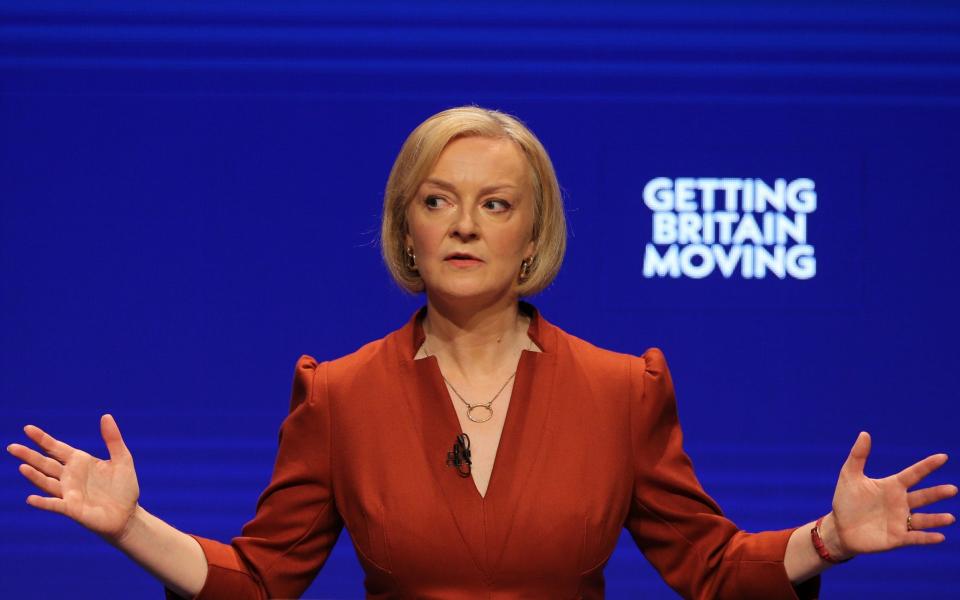Who is really to blame for the Tories' tax-cut chaos?

“Sunak’s five-year tax grab,” was the headline The Telegraph gave to the former chancellor’s £21 billion personal tax raid following the March 2021 Budget.
By freezing the thresholds for income tax, inheritance tax, capital gains tax and the pensions lifetime allowance, this newspaper pointed out how millions of people would end up paying more to the Treasury through a concept known as “fiscal drag”.
Defined as the phenomenon where inflation and earnings growth push more taxpayers into higher tax brackets, we warned that a Conservative government that had promised to cut taxes in its manifesto now ran the risk not only of taxing people more - but taxing them more by stealth. Revenues would still go up, even if there weren’t explicit tax rises.
Fast-forward 18 months and Thursday’s front page proves the prescience of that March 2021 warning.
Households to be worse off on average
Detailed analysis has revealed that income taxes are still set to rise by £21 billion, despite Liz Truss’s “tax-cutting” mini-Budget.
The average household will be £1,450 a year worse off, according to the Institute for Fiscal Studies (IFS), because the frozen tax bands mean the typical basic rate taxpayer will be dragged into paying an extra £500 income tax and National Insurance per year by 2026, while higher rate earners are facing a £3,000 annual increase.
Rishi Sunak said he would not attend this week’s Conservative Party conference in Birmingham because he wanted the Prime Minister to “own the moment”.
But we are fast learning that Ms Truss and Kwasi Kwarteng, her Chancellor, have actually ended up having to take ownership of Mr Sunak’s “five-year tax grab”.
By continuing to freeze the thresholds, the Exchequer will end up with an extra £41 billion of taxpayers’ money - outweighing the cuts to personal taxes worth £20 billion by £21 billion - the exact sum attributed to Mr Sunak's original tax raid.
We are now in the perverse situation of the Tory party being at war with itself over tax cuts, all the time ending up in a situation where voters look like they will still end up paying more tax come the 2024 general election.
How on earth did it come to this?
Politically, it looks messy for the Tories
Mr Sunak blamed the pandemic for freezing the tax bands, telling the House of Commons his measures “might not be popular. But they are honest”.
When he announced the four-year freeze, the former Chancellor arguably could not have known that inflation would surge by as much as 10 percentage points this year - notwithstanding historic fears that quantitative easing would push inflation up sooner or later.
Yet in leaving Ms Truss and Mr Kwarteng with this costly legacy, they appear to have expended a huge amount of political capital - potentially for little quantifiable return.
To be fair to the current Chancellor, there is only so much fiscal furniture he can rearrange if he is to maintain the party's reputation for fiscal discipline.
Having already scrapped the National Insurance increase and reduced the basic rate of income tax to 19 per cent, Mr Kwarteng may be able to argue that more tax cuts next year will leave him more scope to reverse the huge amounts of revenue generated by fiscal drag.
The Government has also given householders a £65 billion energy bailout and there are economists like Julian Jessop, fellow of the Institute of Economic Affairs, who argue that “cutting marginal rates of tax is actually better than ending the freezing of personal allowances, because people better understand a penny off basic rate”.
Yet politically, it all looks rather messy for the Tories.
As Mr Jessop tweeted in response to the IFS’s findings:
It's hard to keep up with all this!
Apparently, #KwasiKwarteng's #miniBudget was both reckless in cutting income tax and irresponsible for not reversing the increases in income tax (via #fiscaldrag) implemented by (*checks notes*) #RishiSunak... 🤷♂️ https://t.co/UAUUNxeQ1t— Julian Jessop (@julianHjessop) October 6, 2022
While a reflection on the IFS’s cakeism over the issue, it also serves to highlight a Conservative Party at sixes and sevens with itself over its own economic policies.
The Treasury insists that the income tax system is “highly progressive”, pointing out that 50 per cent of income taxpayers are expected to pay around 92 per cent of total income tax bill - while the bottom 25 per cent are expected to pay just two per cent.
But the optics aren’t great at a time when various polls show voters now trust Labour more than the Tories to manage the country's finances.

 Yahoo Movies
Yahoo Movies 